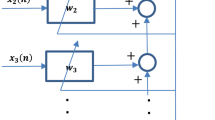Abstract.
This paper is devoted to blind deconvolution and blind separation problems. Blind deconvolution is the identification of a point spread function and an input signal from an observation of their convolution. Blind source separation is the recovery of a vector of input signals from a vector of observed signals, which are mixed by a linear (unknown) operator. We show that both problems are paradigms of nonlinear ill-posed problems. Consequently, regularization techniques have to be used for stable numerical reconstructions. In this paper we develop a rigorous convergence analysis for regularization techniques for the solution of blind deconvolution and blind separation problems. Convergence of regularized point spread functions and signals to a solution is established and a convergence rate result in dependence of the noise level is presented. Moreover, we prove convergence of the alternating minimization algorithm for the numerical solution of regularized blind deconvolution problems and present some numerical examples. Moreover, we show that many neural network approaches for blind inversion can be considered in the framework of regularization theory.
Similar content being viewed by others
Author information
Authors and Affiliations
Additional information
Date received: August 17, 1999. Date revised: September 1, 2000.
Rights and permissions
About this article
Cite this article
Burger, M., Scherzer, O. Regularization Methods for Blind Deconvolution and Blind Source Separation Problems. Math. Control Signals Systems 14, 358–383 (2001). https://doi.org/10.1007/s498-001-8041-y
Issue Date:
DOI: https://doi.org/10.1007/s498-001-8041-y



